新编大学英语第三版book2 unit 3
新编英语教程第三版BOOK2 Unit 3

When may / might as well + do used with the first person pronoun, it expresses “intention” in an unemphatic way.
may / might as well use my bike. The last bus might have gone)
Unit 3
Dialogue I
Pollution Control
Think it
➢ How many kinds of pollution are there nowadays? ➢ What causes these pollution? What bad influences
Questions
Browse through the text, try to answer following questions. 1. Why is London no longer a city full of fog? 2. What is the cause of air and water pollution in the city where the
2. She should / ought to have had more oral practice during the term.
3. She needn’t have learned all the dialogues by heart.
4. 3. He may / might have gone without you.
新编英语教程2第三版第3单元课件
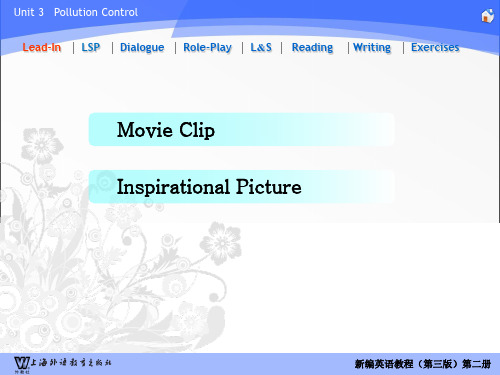
Movie Clip Inspirational Picture
新编英语教程(第三版)第二册
Unit 3 Pollution Control Lead-In LSP Dialogue Role-Play L&S Reading Writing Exercises
新编英语教程(第三版)第二册
Unit 3 Pollution Control Lead-In LSP Dialogue Role-Play L&S Reading Writing Exercises
Inspirational Picture This photo was taken in Linfen, Shanxi province. What does it bring to your mind? Can you describe the picture?
新编英语教程(第三版)第二册
Unit 3 Pollution Control Lead-In LSP Dialogue Role-Play L&S Reading Writing Exercises
all-access hoverchairs: the chairs that float in the air and can go anywhere. This is a special device in which people lie and travel everywhere in the Axiom in this movie.
except John. John should/ought to have come with us.
浙江大学《新编大学英语综合教程(2)》(第3版)学习指南【词汇短语+课文精解+全文翻译+练习答案】
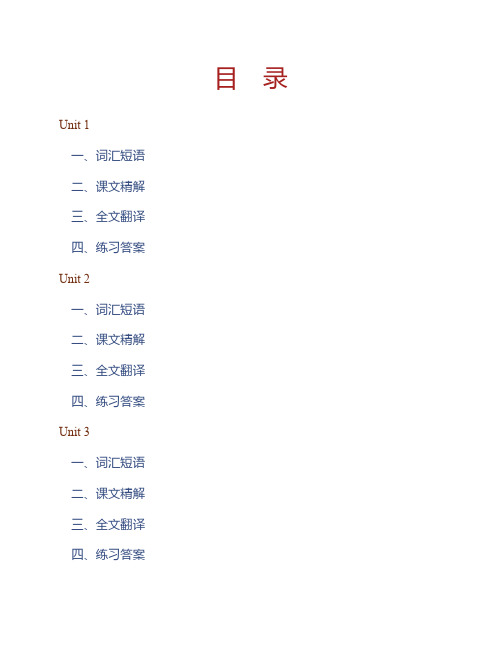
目 录Unit 1一、词汇短语二、课文精解三、全文翻译四、练习答案Unit 2一、词汇短语二、课文精解三、全文翻译四、练习答案Unit 3一、词汇短语二、课文精解三、全文翻译四、练习答案Unit 4一、词汇短语二、课文精解三、全文翻译四、练习答案Unit 5一、词汇短语二、课文精解三、全文翻译四、练习答案Unit 6一、词汇短语二、课文精解三、全文翻译四、练习答案Unit 7一、词汇短语二、课文精解三、全文翻译四、练习答案Unit 8一、词汇短语二、课文精解三、全文翻译四、练习答案Unit 9一、词汇短语二、课文精解三、全文翻译四、练习答案Unit 10一、词汇短语二、课文精解三、全文翻译四、练习答案Unit 1一、词汇短语Part 1. Preparationby its very nature就其本质而言unconditional [5QnkEn5diFEnEl] adj.无条件的,无限制的,绝对的【例句】The victorious army demanded unconditional surrender. 胜方要求敌人无条件投降。
【搭配】unconditional surrender 无条件投降live up to不辜负;做到;实践【例句】In some ways, we failed to live up to one another’s expectations. 在某些方面,我们互相的期望都落了空。
do one’s duty尽职责Part 2. Reading-Centered ActivitiesIn-Class Readingseverely [si5viEli] adv.严格地,激烈地【例句】Those responsible for this crime will be severely punished. 犯下这宗罪行的人将受到严厉惩罚。
severe [si5viE] adj.严厉的,严格的;剧烈的;严重的,严峻的【例句】He’s suffering from severe mental disorder. 他患有严重的精神病。
新编大学英语2第三版U3课文翻译及课后练习答案.doc

After-Class Reading迟做总比不做好1他躺在草从中,躲在那儿,同时思索着。
2他研究了这个小女孩的习惯。
他知道下午三点左右她会从外祖父的房子里出来玩耍。
3他为此举痛恨自己。
4在他悲惨的一生中,他还从来没有考虑过任何像绑架这样冷酷无情的事情。
5然而此时此刻他却躺在草丛里,被树木遮掩着,房了里的人看不见他。
他正等待着一个天真无邪、红头发、两岁人的小女孩向他走近。
6这是一次漫长的等待;有时间进行思考。
7可能在哈伦德的一生中,一切都太过匆忙。
85岁的时候,他那当农民的山地人父亲就去世了。
9 14岁的时候,他就从格林伍徳屮学辍学,开始到处流浪。
10他做过农场的临时工,但他不喜欢那工作。
11他尝试做过公共汽车的售票员,但也不喜欢那工作。
12在16岁的时候,他谎报年龄参了军——可他也不喜欢当兵。
在一年的服役期满后,他前往阿拉巴马州,在那儿试着做铁匠,但没有成功。
13 (后来)他成了南方铁路公司的恢路机车司炉工。
他喜欢那工作,以为自己找到了真正的自我。
14在18岁的时候,他结了婚。
谁知道没几个月,就在他说自己又被解雇了的那一天,他妻子说她怀孕了。
15接着,有一天,当他外出找工作的时候,他年轻的妻子散尽他们所有的家产回娘家去了。
16接下来就是经济萧条时期。
17正如人们所说的那样,哈伦德失去得太多,赢不回来了。
18他确实努力了。
19 一度,当他在铁路上不断地打各种零工的时候,他尝试过通过函授学习法律。
20但他也半途而废了。
21他尝试过卖保险、卖轮胎。
22他尝试过开渡轮,经营加汕站,但都没有用。
23面对现实吧——哈伦徳是一个失败者。
24他现在正躲在列吉尼亚州罗阿诺克郊外的杂草从里,筹划一次绑架。
25就如我所说的,他已经观察过这个小女孩的习惯,知道她下午玩耍的时间。
26但是,这一天,小女孩却没有出来玩,所以他那失败之链依旧没有中断。
27在他后来的生活中,他成了科尔宾一家餐馆的主厨和刷瓶工。
一切都挺好,直到冇一天新的公路绕餐馆而过。
新编大学英语BookIIUnit3教案
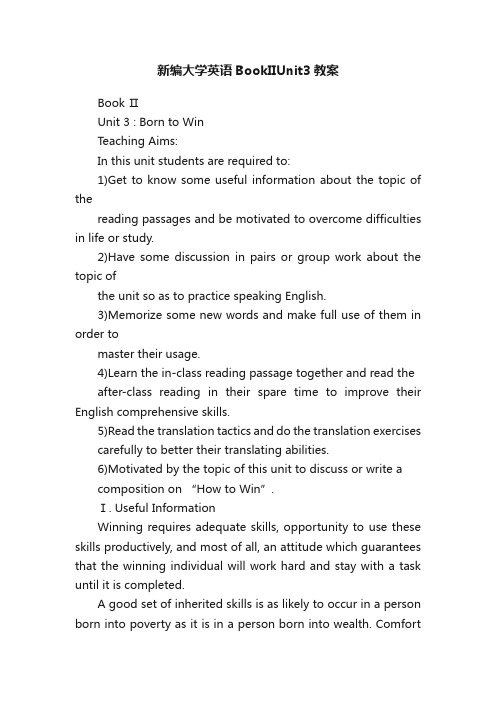
新编大学英语BookIIUnit3教案Book ⅡUnit 3 : Born to WinTeaching Aims:In this unit students are required to:1)Get to know some useful information about the topic of thereading passages and be motivated to overcome difficulties in life or study.2)Have some discussion in pairs or group work about the topic ofthe unit so as to practice speaking English.3)Memorize some new words and make full use of them in order tomaster their usage.4)Learn the in-class reading passage together and read theafter-class reading in their spare time to improve their English comprehensive skills.5)Read the translation tactics and do the translation exercisescarefully to better their translating abilities.6)Motivated by the topic of this unit to discuss or write acomposition on “How to Win”.Ⅰ. Useful InformationWinning requires adequate skills, opportunity to use these skills productively, and most of all, an attitude which guarantees that the winning individual will work hard and stay with a task until it is completed.A good set of inherited skills is as likely to occur in a person born into poverty as it is in a person born into wealth. Comforthas often been the curse of the wealthy, and there is little support for the idea that a life of ease will lead to a life as a winner.In nearly every field of work or profession there are winners who have come from humble beginnings. In these books such as: Rags to Riches, Risen from the Ranks, facing the World, The Young Explorer, the hero figure comes from a humble beginning, but through hard work, serious study, attention to the rules, and good virtue, he becomes a winner in life. Indeed, these books became the introduction for many young Americans to the co ncept that “Whenthe going gets tough, the tough get going.” It may be true that virtue is not always rewarded, but most persons behave as if in fact this is usually true. Sayings like “Honesty is the best policy”, “Nothing succeeds like success”, “Genius is more often due to perspiration than inspiration”, “Winners never lose, losers never win”are so common that they sometimes are not appreciated for the influence they have on young persons.In addition, there are many stories of athletes, artists, musicians and actors, etc., who have overcome great handicaps to become winners in their fields of performance. The next time when you see a person who is a winner in life, remember that it is not that they were “born to win”. The usual case is that they had formed good habits of learning and living, and they had an attitude which caused them to succeed and never to consider defeat or loss as an acceptable outcome.Ⅱ. Preparation1.Talk about the meaning of winning. Ask students to talkabout “What does winning mean?”Samples:1)Winning means being happy.2)Winning means being No.1 or one of the best in your field.3)Winning means being able to make great contributions tosociety.4)Winning means being able to overcome great difficulties thatothers can’t.5)Winning means making a lot of money.6)Winning means doing what you enjoy and being good at it.7)Winning means having good health and a happy family.8)Winning means that you can be the kind of person you want tobe.2.Winners in my eyes. Ask students to give an example of thewinner in their eyes.Samples:1)I think Helen Keller is a winner. Even though she becameblind and deaf at a very early age, she didn’t give up. With the help of her teacher, she became a teacher, writer andlecturer. She couldn’t see or hear, but shi learned to read andwrite by touch and feel. Helen also learned several foreign languages: French, German, Latin and Greek. Helen always wanted to try what others could do.2)For me, my father is a winner. He was born into a very poorfamily. He hardly had enough to eat. Every week he had to walk 20 kilometers to school. Though he dropped out later due to the lack of money, he taught himself and became a teacher at a village school. He sent my brothers and me to school. Now my brothers and I are all studying in nationalkey universities. For others, my father may be a very ordinary person. But to me, he is a real winner.3.What accounts for success? Read the story with the students,then ask them to conclude the moral of the story. Give their o pinions on “What Accounts for Success?”Samples:I think intelligence and hard work are the most importantthings. First you must be intelligent. You won’t he able to succeed if you are stupid. But intelligence alone is not enough. You also need to work hard. Success is something you have to earn painstakingly.Ⅲ. Listening-Centered ActivitiesViewing, Understanding And SpeakingPlay the video for at least three times. For the first time, the students are expected to only watch and enjoy it, then the second time to do exercises, the third time the teacher can stop the video appropriately with explanation about the difficulties.For listening exercises One, Two, Three, the teacher can play them several times with relevant explanations as well. Besides, More Listening exercises can be chosen if time permitted.In-class readingIV. In-Class ReadingWords, Phrases and Grammatical Points1.capability (l.4) / capacity (l.12)capability1)the quality of being able to do something; ability 能力,才能,性能e.g.I.You have the capability of doing this job well.II.Does the company have the capability to change to meet market needs?2)the ability that a country has to take a particular kind ofmilitary action军事能力e.g.In fact the country has no military capability of its own.capacity1) someone’s ability to produce, experience, understandor learn something能力,才能e.g.I.Our capability for giving care, love and attention islimited.Ⅱ. Children have a remarkable capacity to learn language.3)the amount of space a container, room, etc. has to holdthings or people容量,容积e.g.I.This bottle has a large capacity.II.The room has a seating capacity for about 80.4)the amount of something that a factory, company,machine, etc. can produce or deal with产量,生产力e.g.I.All factories are working at full capacity.II.The company has the capacity to build 1,500 trucks a year.5) a particular position or duty职位,身份e.g.I.She is employed by them in an advisory capacity.II.I attended the meeting in my capacity as chairman of the safety committee.2.limit (n.) / limitation (l.4)limit n.1)the point, edge, or line beyond whichsomething cannot or may not proceed限度,界限e.g.I.No fishing is allowed within a twenty-milelimit.II.He has not been outside the limits of theprison walls for 20 years.2)the greatest or least amount, number, speed,etc. that is allowed or possible限额e.g.I.The speed limit on this road is 70 mph.II.He borrowed money up to the limit that thebank allowed.limitation1)a shortcoming or defect, a condition of limited ability局限,缺陷,弱点e.g.I.He knows his capabilities and limitations.II.The European Community should recognize its limitations.2)the act of limiting or the state of being limited限制,限度e.g.I.They resist any limitation of their powers.II.Such limitation on women’s powers cuts into all classes and races.3)the condition, fact or circumstance that limits限制因素e.g.I.There are also technical limitations.II.The government imposed limitations on exports.3.chance (l.12)1)the possibility that something will happen 可能性e.g.I.The chance of rain is less than 20%.II.What are her chances of survival?III.You’d have more chance of catching the train ifyou got a bus to the station instead of walking.2)an opportunity for you to do something,especially something you want to do 机会e.g.I.We work together whenever we get a chance.II.I can explain everything if you’ll just give me a chance.III.You should take the chance to travel while you’restill young.4.enter (l..45)1)come or go into 进入,进来e.g.I.The thieves entered the building by the back door.II.Few reporters dared to enter the war zone.2)become a member of 加入,成为……的成员e.g.I.She entered the club last year.II.Both boys entered the army.3)begin or become involved in an activity, a situation, etc. 参加,加入e.g.I.Everyone in the class entered the race.II.At least 30 schools entered the competition.4)put information into a computer or be given permission to use a computer system储存(信息),允许使用(计算机系统)e.g.I.Press the return key to enter the information.II.The syst em won’t let you enter without a password. Structure of the passage:1) Introduction (para. 1)Each person has the potential to win in his own way.2) The meanings of “winner” and “loser” (para. 2)A winner is one who responds genuinely by being trustworthy and responsive.A loser is one who fails to respond genuinely.3) Few people are winners and losers all the time. (pare. 3)4) Winners (para. 4—7)Characteristics of a winner:A. A winner is genuine.B. A winner is not afraid to do his own thinking and to use his own knowledge.C. A winner has a love for life.D. A winner cares about the world and its people.5) Losers (para. 8—10)Possible causes: Poor nutrition, cruelty, unhappy relationships, disease, continuing disappointments and inadequate physical care. Characteristics of a loser:A. A loser lacks an ability to appropriately express himself through a full range of possible behavior.B. A loser has difficulty giving and receiving love.Questions for Group Discussion:Directions: Work in groups to discuss the following questions.1) What characteristics do winners or losers have?2) Do you consider yourself a winner? What do you need tobecomea winner?Translation:Lack of confidence contributed to his failure.She has shown great courage in the face of her serious illness.We came to the conclusion that she was telling the truth.His secretary failed to tell him about the meeting.Learning languages isn’t a matter of memorizing words.Once she has made her decision, no one can hold her back.It will be difficult to live up to the standards set by our captain.The scientist referred to the discovery as the most exciting new development in this field.V. Further DevelopmentProverbs:Failure is the mother of success.Any man who is afraid of failure will never win.Success means that you enjoy and are good at doing what you are doing now.One who is eager to win will not necessarily win quickly.A successful person doesn’t ask for things from others. On the contrary he will ask himself: “What can I leave to this world?”A real winner is someone who makes the greatest contributions to the society, not the one who is the richest, or the most famous. Writing.Some people say winning means being rich, some people say winning means being powerful, and other people say winning means being happy. Please write a paragraph of about 120 words about YOUR understanding of winning.。
新编大学英语2Unit3教案
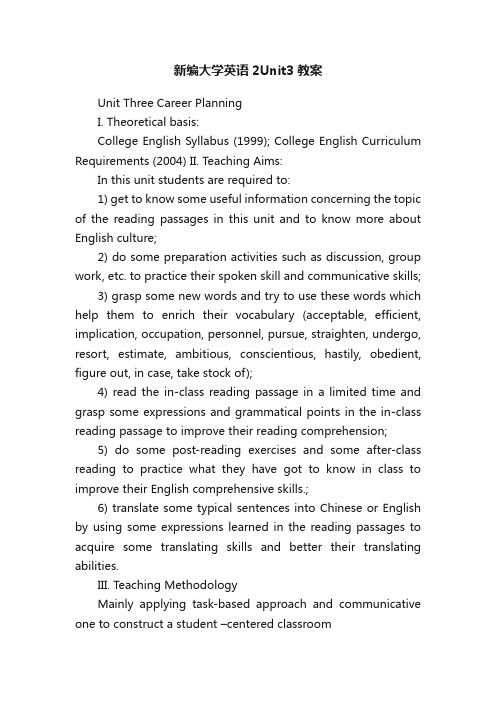
新编大学英语2Unit3教案Unit Three Career PlanningI. Theoretical basis:College English Syllabus (1999); College English Curriculum Requirements (2004) II. Teaching Aims:In this unit students are required to:1) get to know some useful information concerning the topic of the reading passages in this unit and to know more about English culture;2) do some preparation activities such as discussion, group work, etc. to practice their spoken skill and communicative skills;3) grasp some new words and try to use these words which help them to enrich their vocabulary (acceptable, efficient, implication, occupation, personnel, pursue, straighten, undergo, resort, estimate, ambitious, conscientious, hastily, obedient, figure out, in case, take stock of);4) read the in-class reading passage in a limited time and grasp some expressions and grammatical points in the in-class reading passage to improve their reading comprehension;5) do some post-reading exercises and some after-class reading to practice what they have got to know in class to improve their English comprehensive skills.;6) translate some typical sentences into Chinese or English by using some expressions learned in the reading passages to acquire some translating skills and better their translating abilities.III. Teaching MethodologyMainly applying task-based approach and communicative one to construct a student –centered classroomThe whole learning and teaching proceed is tended to follow the model of pre-task------task cycle------post-taskIV. Time DistributionAccording to Ss’English learning traits and regulations, the focus of the learning strategies, and the English level of current students; we are going to finish this unit in 8 periods: Listening & Speaking (2 periods); In-class Reading (6 periods); Exercise & After-class Reading (1 periods); Further Development &Writing (1 periods).Period I&II listening and speakingI、Teaching Content1) T’s background knowledge introduction as recruitment and Ss’ discussion onthe topic of career planning, and enlarge their vocabulary on this unit.2) Listening of 1 passagesII、Teaching designPart One: Preparation1. Name different occupationsDescribe pictures: You will have 3 minutes to list as many names of occupations as possible.singer, dancer, actor, writer, accountant, waiter, librarian, secretary, estate agent,fashion designer, composer, editor, psychologist, dentist, driver, economist, engineer, politician, salesman, gardener , craftsman, broadcaster2. Describe a career you’re likely to pursue in the future. Don’t mention its name but ask your classmates to guess what it is.Sample:The job I’d prefer to take has a flexible working schedule. I don’t have to be at work exactly on time. Much of my time will be spent sitting in front of the computer or going through the work written by others. When work is due, I will have to burn the midnight oil. But when there is no work, I can take time to enjoy myself even if I’m still at work. This job needs a lot of initiative and independence. I’ll have to contact potential writers all by myself and choose the topics and books that might sell well or have good academic value. I’ll ne ed to be very careful, doing the proofreading many times until a book is finally published.Scientific, social, realistic, artistic, computational, practical, nature, outdoor, active, conventional, technical, organization, files, machines, laboratory jobs, music, teach, help, sales job, political jobsScientific——are you interested in knowing how and why things work?Social ——are you interested in caring for others and helping them with their problems?General service ——would you like a job which involves offering service to other people?Artistic —— would you like to use artistic or creative abilities?Computational ——do you have an aptitude for working with figures or solving mathematical problems?Nature ——are you interested in working with plants or animal?Outdoor/active ——would you like to be out and be physically active? Leadership——are you interested in persuading people to do something? Conventional ——would you like to work with organizations, files and regular schedules.give some examples to your chosen category.Scientific: scientists, research workers, chemists, biologists, etc.Social: teachers, doctors, psychologists, layers, etc.General service: volunteers, policeman, etc.Artistic: singers, actors, directors, pianists, violinists, etc.Computational: accountant, cashier, statistician, etc.Nature: biologists, zoologists, botanists, etc.Outdoor/active: sportsmen, explorers, mountaineers, etc.Leadership: politician, salesmen, retailer, etc.Conventional: civil servant, secretary, etc.3. Top 10 jobs:software engineerInsurance agentdoctorsexcellent Tour guideBiomedical engineerCadet teacherSystem designerEstate agentProject managerCustoms agent4. What factors will influence you in choosing a job?---a high salary---lots of perks (e.g. a company car, travel expenses, vacation) ---good promotion prospects.---an opportunity, through your job, to sever others in the community /insociety.---pleasant, friendly working atmosphere.---short working hours---not more than 35 hours a week.---a good boss---pleasant colleagues---career orientation---suitable for one’s natural/professional talents/skills---interesting tasks---good safety record---clean environment---canteen for the staff---good location (near bus stop, etc)---opportunities for travel---opportunities for professional development /job training ---daycare facilities---school nearbyPart Two: Listening-centered Activities1.What kind of job is suitable for you?Listen to 14 statements carefully and decide which category of jobs they belong to.What do you think the most ideal occupation is?How are you preparing for your future career?What are the steps to get a world-class job?2. Video clipCareer choice is always a hard decision for mothers. They, on the one hand, may like to stay at home looking after their babies and on the other hand, may like to fulfill their own personal career development as well. Watch the video and see what is Mar ilyn’s problem and guess her decision.Part Three: Assignmentto prepare the new words on the textbook.Period 3&4 ReadingI、Teaching ContentThe title of the text is ―Career Planning‖(intensive reading). Language points explanation, exercise.II、Teaching Objects1)Understand and master new words and phrases: course of action, hyper-, inreality, not much, at stake, confront, face, resort to, seize on, work out, in case, every so often, take steps to do sth, talk over, etc.3) Improve Ss micro-reading skills and the ability of thinking, inference andjudge in English.III、Teaching DesignA. GreetingB. Check the assignment: new words dictationC. Pre-Reading ActivitiesWork in pairs and discuss the following questions.1. Are you planning your future career? If so, what is the career you are aiming for?2. How are you preparing for your future career?Enriching Your Word Power1. invent -inventorlogical -illogicalmoral -immoralpursue -sued, -suinge.g. Bad luck pursued us. 厄运纠缠着我们。
浙江大学《新编大学英语综合教程(2)》(第3版)(练习答案 Unit 3)【圣才出品】

四、练习答案Part2.Reading-Centered ActivitiesIn-Class ReadingReading Comprehension1.1.Introduction(Para.1)Each person has the potential to win in his own way.2.The meanings of“winner”and“loser”(Para.2)A winner is one who responds genuinely by being trustworthy and responsive.A loser is one who fails to respond genuinely.3.Few people are winners or losers all the time.(Para.3)4.Winners(Paras.4-7)Characteristics of a winner:A.A winner is genuine.B.A winner is not afraid to do his own thinking and to use his own knowledge.C.A winner is flexible.D.A winner has a love for life.E.A winner cares about the world and its people.5.Losers(Paras.8-10)Possible causes:Poor nutrition,cruelty,unhappy relationships,disease, continuing disappointments,and inadequate physical care.Characteristics of a loser:A.A loser lacks the ability to appropriately express himself through a full range of possible behavior.B.A loser has difficulty giving and receiving love.2.1.C2.A3.A4.B5.C3.OmittedVocabulary1.1.appreciateA.be pleased about sth.that sb.has done for you感激B.recognize its good qualities欣赏,赏识2.capacityA.the amount that sth.can hold or contain容量,容积,容纳力B.ability or power能力,才能3.channelA.(n.)band of frequencies used for a particular set of radio or television programmes频道B.(v.)arrange for them to be used for that thing,rather than for a wider range of things调拨4.contributeA.join with others in giving捐献,捐赠,贡献出B.help in causing a situation,event,or condition有助于,促成5.flexibleA.that can bend easily without breaking有弹性的,柔韧的B.easily changed to suit new conditions灵活的,可变通的6.guiltA.the state of having committed an offense罪,罪行B.remorse caused by feeling responsible for some offense内疚,自责,悔恨7.potentialA.(adj.)that may happen or become so潜在的,可能的B.(n.)(the degree of)possibility for developing or being favorably developed潜力,潜能8.rigidA.stiff;not bending or yielding硬的,不易弯曲的B.strict;firm;unchanging严格的,刻板的2.3.Translation1.A lot of things contributed to the end of my relationship with that company.2.She showed great courage in the face of serious illness.3.We came to the conclusion that she was telling the truth.4.His secretary failed to tell him about the meeting.5.Learning a language isn’t just a matter of memorizing words.6.Once she has made her decision,no one can hold her back.7.They said they would study hard and live up to their parents’expectations.8.The scientist referred to the discovery as the most exciting new discovery in this field.Part3.Further Development1.Grammar Review1.Had they signed the contract ahead of time,they could not have missed the plan.2.Had we not been interrupted yesterday,we would have finished the work.3.Had he not been working hard in the past five years,things wouldn’t be going so smoothly.4.Were they to cease advertising,prices would be significantly reduced.5.Had you taken his advice,you wouldn’t have made such a mistake.2.Vocabulary Review3.Winners or Losers?Omitted4.Live Your DreamsOmitted5.An Interview with a Successful WriterOmitted6.That’s Me!OmittedPart4.Translation and Writing2.Translation Practice1.Failure is the mother of success.2.Any man who is afraid of failure will/can never win!3.Success means that you enjoy/love and are good at doing what you are doing now.4.One who is eager to win may not necessarily win quickly.5.A successful person doesn’t ask for things from others.On the contrary/Instead, he will ask himself:“What can I leave to this world?”6.A real winner is someone who makes the greatest contributions to society,not the one who is the richest or the most famous.3.WritingOmitted。
新编大学英语第三册2单元B3U2 演示文稿
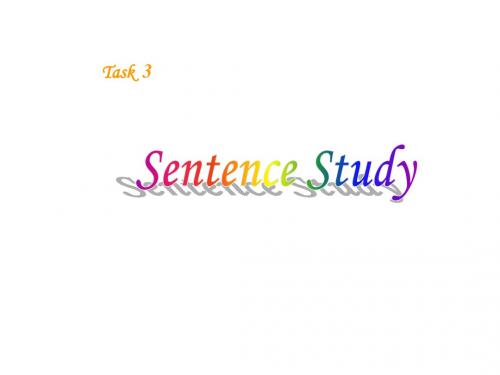
佳 句 欣 赏
本句采用了明喻的修辞手法,非常形象地说明 了乌龟饥饿的程度。like是介词,表示“像…… 一样”,是这个比喻句的比喻词, his body 是 本体,a dry stick是喻体。明喻(simile)是就 两个不同类对象之间的相似点进行比喻。明喻 中常用like做比喻词,此外还有as, as if, as though, as…as, similar to, 等等。
忠贞的,贞洁的
Exercise
词义练习: 请标出下面各句中faithful 含义的序号并翻译句子
He is faithful in word and deed. 忠实的
他言行忠实。
He will be faithful to you if you marry him. 忠贞的
假如你与他结婚,他会对你忠 诚的。
We must be _____ to our motherland. loyal
他信守诺言。
faithful He is _______ to his promise.
deliver (v.) (Line 67, Para. 19)
1) take something (to someone or some place) 送递
Example
Her happiness vanished like the morning dew.
她的幸福像晨露一样消失了。
Beauty is as summer fruits, which are easy to corrupt and cannot last.
美者犹如夏日蔬果,易腐难存。
It rained as if the flood-gates of Heaven were opened, and it lighted awfully.
- 1、下载文档前请自行甄别文档内容的完整性,平台不提供额外的编辑、内容补充、找答案等附加服务。
- 2、"仅部分预览"的文档,不可在线预览部分如存在完整性等问题,可反馈申请退款(可完整预览的文档不适用该条件!)。
- 3、如文档侵犯您的权益,请联系客服反馈,我们会尽快为您处理(人工客服工作时间:9:00-18:30)。
可以用作主语补足语的成分 形容词、名词、数词、不定式、分词、介词短 语、从句均可作主语补足语。 1.动词see, watch, hear, feel, listen to, look at,imagine等后面接分词用作主语补足语。 e.g. He is often heard reading English. The classroom was found crowded with people. 2.感官动词see, watch, hear, notice, feel, make等后面接带to的不定式用作主语补足语。 e.g. He was seen to come upstairs.
Global Reading Step 1
Winner My Understanding Loser
The author’s definition
Extending Discussion: Why do you think different people interpret winning and losing in different ways?
Step 2
Read the text again. Group A are required to focus on paragraphs 4-7 while Group B reread paragraphs 8-10. Then each group is going to answer questions respectively.
Step 2
The key words and phrases are focused on in their meanings and usage.
Detailed Reading Step 1
For Group A Winners Examples of their characteristicmple 1. Without you I feel life is pointless. Without me you cannot lead a enjoyable life. 2. Without money people spare no efforts earning more. Without health people feel regret and dream to pay for it.
主语补足语的位置灵活多变 Example 1. Upset and sleepy, he went home. (位于主语之前) 2. Lily, short and fat, moved the audiences by her beautiful voice.(位于主语之后) 3. He died young.(位于谓语动词之后)
Exercise 1. He went downtown, bought some books and visited his teacher .(买了一些书,拜访了他的老 师) 2. Your semester grade is based not only on how well on how you participate you do on each test, but also ___________________ in class .(基于你的课堂表现) 3. Some find swimming more enjoyable than sitting at home reading . (在家阅读) 4. She is pleased with what you have said and all that you have done for her . (为她做的一切)
Before Reading
Before Reading
A Trick Question
Do you think it is a must for people to be a winner, even only once, in the lifetime?
Before Reading Step 1
平行结构注意事项 1. 并列连词and, but, as well as, or, or else, both...and..., neither...nor..., either...or..., not only...but (also)..., rather than等以及从属连词than可连接两个对 等的词和对等的结构。需要注意的是,所连接的 词、短语、谓语结构、非谓语形式或者句子结构 都必须一致。 2. 某些特定的词(如prefer)以及一些特定结构 (如would/had rather/sooner do sth. than do sth., would/had as soon do sth. as do sth.)后面要使用平行结构。
Example 1. Fruits, fresh vegetables and whole grain products are part of a healthy diet. 2. While driving across the country, Mary planned to camp in Grand Canyon, hike in Rocky Mountains, and swim in the Pacific Ocean.
句子分析 With the structure “Without… he does sth. . Without… he does sth.”, these two sentences are both parallel and contrasting. Besides, the author makes use of alliteration(押头韵), which makes it easy to read(读起来琅琅上口).
Paraphrase He not only listens to others, but also consider their words and makes a judgment. Nevertheless, he would draw a conclusion by himself.
译文 他心安理得地从自己的成就中享受乐趣。他 (也)毫无妒忌地欣赏他人的成绩。
1. What factors in childhood may contribute to making people losers? 2. What are the characteristics of losers?
Detailed Reading
Step 1
Detailed Reading
Group A are required to find out some examples of the characteristics of winners. Group B are asked to search out some key words/phrases concerning the characteristics of losers.
Paraphrase He enjoys his own success without feeling guilty. At the same time, he cherishes the achievements of others and doesn’t show envy to them.
Global Reading
Questions for Group A
Step 2
1. What is the most important thing for winners? 2. What are the characteristics of winners?
Questions for Group B
3.介词短语用作主语补足语。 e.g. The books in the study must be kept in good order. 4.as后面接名词、形容词、分词等用作主语补足语。 e.g. English is taken as a useful means for research work. The news is considered as true. The stool is usually thought as having four legs. 5.由what引导的名词性从句用作主语补足语。 e.g. The boy has been made what he is.
All the students are divided into two groups (Group A & Group B) according to their answers to the trick question.
Step 2
Have a debate. The debate should begin by the statements on their understanding of “winner ” and “loser”. Then, both groups are going to give supportive evidences concerning their different answers to the trick question.
UNIT 3 BOOK 2
Born to Win
外语教学与研究出版社 浙江工商大学大学英语省级精品课程组
Born to Win
PART 2 Read by Critical Thinking
In-Class Reading
After-Class Reading
In-Class Reading
Before Reading Global Reading Detailed Reading After Reading
句子分析 In the sentence, “listens to…, evaluates…, but comes to…” is a “parallel structure” (平行结构). Writing in parallel structure requires you to match the grammatical form of words, phrases, or clauses within a sentence. This is a structure that lends grace to writing, highlights particular ideas and makes your writing easier to understand.
